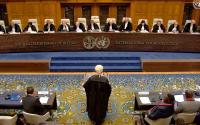Fernand Braudel Center, Binghamton UniversityList of previous commentaries in English and translations in other languagesCommentary No. 179, Feb. 15, 2006
Much of the discussion about Iran's nuclear program is quite simply hysterical. Witness the statement of Sen. John McCain just this month: "There's only one thing worse than military action and that's a nuclear-armed Iran." One is tempted to respond with Shakespeare's title: "Much ado about nothing." Except that there's an awful lot of "ado" and some people in high places seem to be serious about engaging in military action to stop Iran from securing nuclear weapons. So we have to ask why is this so important, and so important to whom?
First of all, why should we consider it to be a catastrophe if tomorrow Iran has nuclear weapons? There are today nine countries known to possess nuclear weapons - the U.S., Great Britain, Russia, France, China, Israel, India, Pakistan, and North Korea. What would change if Iran became the tenth? Who would be menaced by Iran? Which country might they bomb? At the present time, there is no indication of any kind that Iran is or intends to be militarily aggressive. To be sure, the current president of Iran, Mahmoud Ahmadinejad, has made very hostile statements about Israel. But does anyone think he intends to bomb Israel, or that Iran has the military capacity to do so? Rhetoric and intentions are two different things.
But if Iran doesn't intend to use the bomb, why would Iran want to have it? There are some obvious reasons. Of the nine countries that have the bomb, all but one have bases close enough to use it against Iran. The Iranian government would have to be very naive not to worry about this. Furthermore, they can easily deduce from U.S. policy of the last five years that the U.S. invaded Iraq but not North Korea, and that one of the greatest differences between the two was that Iraq did not have nuclear weapons and that North Korea did.
A second obvious reason is Iranian nationalism. We must remember that Iranian aspirations to be a nuclear power did not start with the current president. They go all the way back before the Iranian revolution to the days of the Shah of Iran. Obviously, today a "middle" power of the size of Iran will enhance its geopolitical strength if it's a member of the nuclear club. Iran has its national interests, as all other states do, and it clearly wishes to play a central role in its region.
But does this in itself menace the peace of the world or of the region? When the Soviet Union had its first nuclear explosion in 1949, the lamentations of the Western world were very loud. But it is clear in retrospect that the single factor which most contributed to the non-occurrence of an American-Soviet war from 1949 to the dissolution of the Soviet Union in 1991 was the fact that both powers had nuclear weapons. It was the fear of mutual destruction that guaranteed that neither would use nuclear weapons, despite all the acute tensions from the Berlin blockade to the Cuban so-called missile crisis to the war in Afghanistan. The fact that both India and Pakistan have the bomb has been a very strong constraint on their conflict over Kashmir.
Why would not the balance of terror operate equally well in the Middle East? Why would not the possession by Iran of nuclear weapons be an element in pacifying the Middle East rather than the reverse? The only answer offered is that the Iranian government is not sufficiently "rational" to abstain from using the bomb. But this is clearly nonsense - racist nonsense, one should add. The present Iranian regime is at least as politically sophisticated as the Bush regime, and is a lot less vocally militarist.
Then, why is everyone making so much fuss? Henry Kissinger explained it over a year ago and Thomas Friedman has recently repeated it in The New York Times. It is quite clear that, once Iran has nuclear weapons, the dike will have been breached, and a good 10-15 other countries will work very fast to acquire such weapons. There are some obvious candidates: South Korea, Japan, Taiwan, Indonesia, Egypt, Iraq (yes, Iraq), South Africa, Brazil, Argentina, and many European countries. In 2015, there may be twenty-five nuclear powers.
Is this dangerous? Of course, it is, in the sense that there are always crazy individuals and groups who might get access to the buttons that need to be pushed. But these crazy people or groups exist in the present nine nuclear countries and I personally do not believe there are more of them in the next fifteen. Nuclear disarmament is an objective that is urgent, but not nuclear disarmament of just part of the world - nuclear disarmament of everyone.
The reason that the United States in particular is so agitated about Iran's potential nuclear armament is that the spread of nuclear weapons to so-called middle countries clearly reduces the military strength of the United States. But that doesn't mean that it threatens the peace of the world. Should we then worry about an invasion of Iran by the United States or an Israeli attack? Not really, because the U.S. does not now have the military strength to engage in such an attack, because the Iraqi regime would not support it, and because Israel can't do it alone. So, much ado about nothing.






